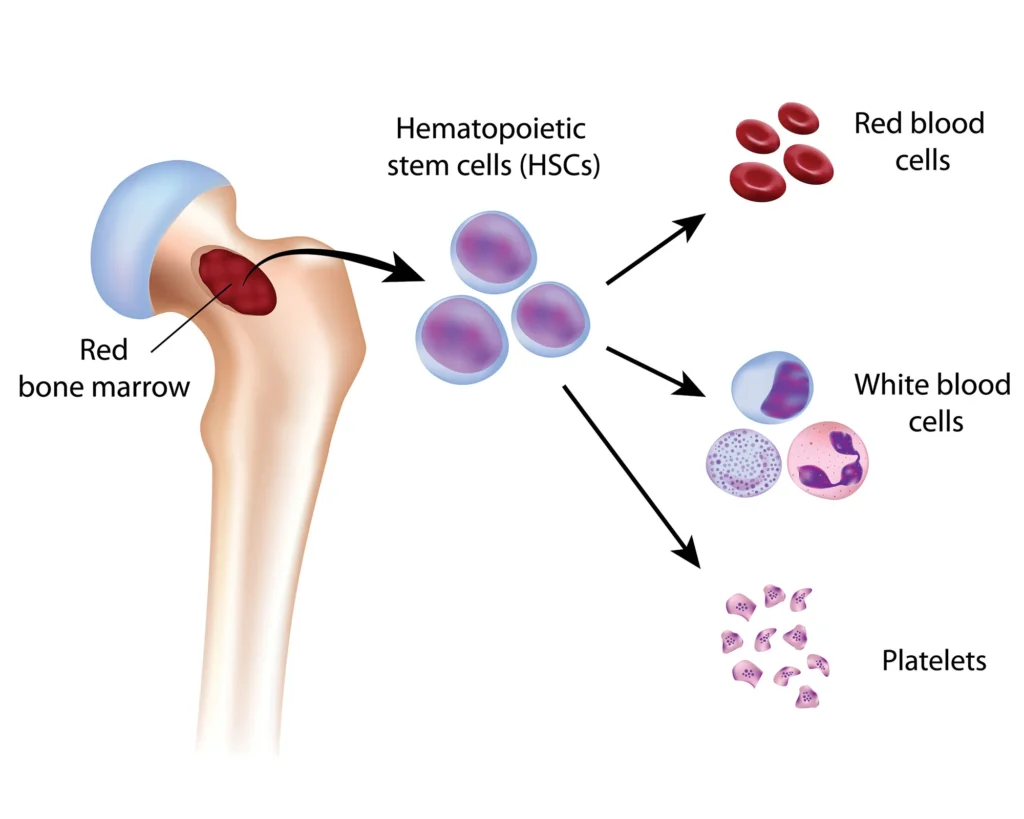Myelodysplastic Syndromes (MDS)

Overview
Myelodysplastic syndromes (MDS) are a group of blood disorders caused by poorly formed or dysfunctional blood cells in the bone marrow. MDS is considered a precancerous condition that may progress to acute myeloid leukemia (AML) in some patients. It is more common in older adults.
Symptoms
- Fatigue or weakness (due to anemia)
- Shortness of breath
- Pale skin
- Easy bruising or bleeding
- Frequent infections
- Petechiae (tiny red spots under the skin)
Causes & Risk Factors
- Aging (most common in people over 60)
- Previous chemotherapy or radiation
- Exposure to chemicals (e.g., benzene)
- Inherited bone marrow disorders
- Smoking
Diagnosis
- Complete blood count (CBC) and peripheral smear
- Bone marrow biopsy and aspiration
- Cytogenetic testing (chromosomal analysis)
- Molecular mutation testing (e.g., TP53, SF3B1)
Treatment Options
- Supportive care (e.g., transfusions, antibiotics)
- Growth factors (e.g., erythropoietin)
- Hypomethylating agents (e.g., azacitidine, decitabine)
- Immunosuppressive therapy (in selected patients)
- Allogeneic stem cell transplant (only potential cure)
Prognosis
- Depends on subtype, risk classification, and cytogenetics
- Low-risk MDS may be stable for years
- High-risk MDS has higher progression to AML
- Prognostic tools: IPSS, IPSS-R, molecular risk models
Living with this Cancer Type
- Regular blood monitoring
- Managing transfusion dependency
- Infection prevention
- Nutritional support and fatigue management
- Mental health and palliative care planning if needed
Prevention & Screening
- No general screening recommendations
- Avoid exposure to toxins (e.g., benzene)
- Monitoring for patients with prior chemo/radiation
FAQs
Q: Is MDS a type of cancer?
A: It’s a bone marrow failure disorder that can evolve into leukemia.
Q: Can MDS be cured?
A: A stem cell transplant is the only curative option, but not all patients are eligible.
Q: How fast does MDS progress?
A: It varies—some forms are indolent, others aggressive and fast-evolving.
Resources
- MDS Foundation (mds-foundation.org)
- Leukemia & Lymphoma Society
- ClinicalTrials.gov
Understand Precision Testing
Learn how liquid biopsy and chemo sensitivity testing can personalize your treatment plan.
Make Informed Decisions
Gain knowledge to actively participate in treatment discussions with your healthcare team.
Improve Treatment Outcomes
Discover how precision medicine and metabolic therapies can enhance treatment effectiveness.
Start Your Educational Journey Today
Empower yourself with knowledge about precision metabolic oncology and take an active role in your cancer care journey.
Need More Information?
Our team of oncology experts is here to help you understand your diagnosis and treatment options.
